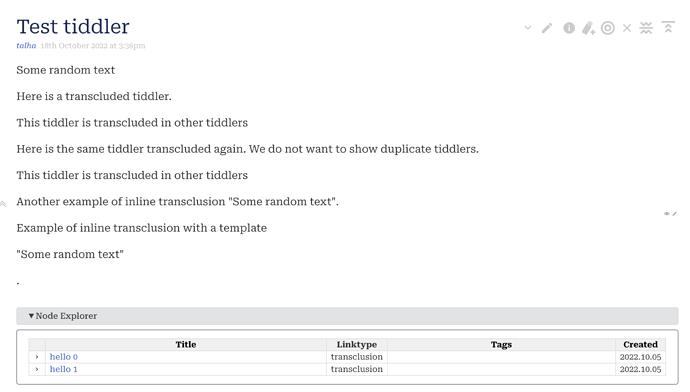What am I trying to do?
I am writing a regex that can extract transcluded tiddlers and show them in the Shiraz Node-Explorer table. Say a tiddler has the following body:
Some random text
Here is a transcluded tiddler.
{{hello 0}}
Here is the same tiddler transcluded again. We do not want to show duplicate tiddlers.
{{hello 0}}
Another example of inline transclusion {{hello 1}}.
Example of inline transclusion with a template {{hello 1||$:/talha131/Template/NavigateTranscludedTiddler}}.
Then regex should extract the two tiddlers.
- hello 0
- hello 1
What have I done so far?
This is the regex that I come up with. It can extract the transcluded tiddlers from the body.
[all[current]get[text]splitregexp[\n]search::regexp[{{.+?}}]search-replace:g:regexp[.*{{(.+?)\|\|.+}}.*],[$1]search-replace:g:regexp[.*{{(.+?)}}.*],[$1]unique[]]
And it works fine. 
What’s the issue?
I need a way to exclude transclusion syntax if it happens inside pre-formatted text or inside some widgets.
For example, it should ignore. 
{{hello 1}}
Because it is inside code block.
It should also ignore {{ [<splitme>] }} 
<$list filter="[[hello 1]regexp:text[{{(.+?)}}]]" variable="splitme">
<$text text={{{ [<splitme>] }}}/><br/>
</$list>
Because it is not transclusion although it matches the syntax.
How can I solve this issue? I think if there is a filter that can return only the normal part of the tiddler body, i.e. removing code blocks, widgets and macros, then I can apply regex on the left over text.
